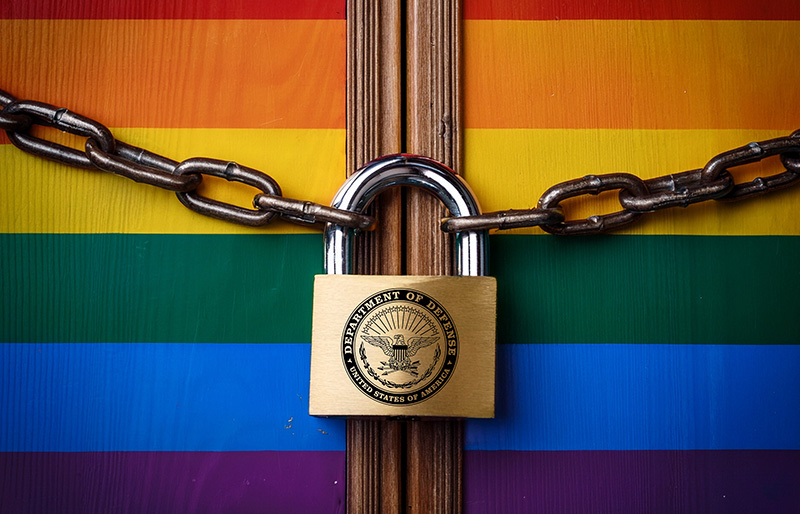HRC calls for filibuster against Gorsuch
Nation's top LGBTQ organization continues historic opposition to Donald Trump's Supreme Court pick

In an unprecedented step, the nation’s largest LBGTQ rights organization is calling for a filibuster of the nomination of Judge Neil Gorsuch, Donald Trump’s first nominee to the U.S. Supreme Court.
On Monday morning, the Human Rights Campaign issued a statement calling on every member of the U.S. Senate who supports LGBTQ rights to not only vote against confirming Gorsuch, but to mount and sustain a filibuster to ensure he is never seated on the nation’s highest court.
“Last week, Neil Gorsuch refused to answer basic questions regarding his alarming history of opposing civil rights,” said HRC President Chad Griffin. “Anyone looking to gain a lifetime appointment to our nation’s highest court must prove they will apply a compassionate, impartial, and inclusionary interpretation of the Constitution faithful to its drafters’ vision — and Judge Gorsuch proved he is not that person.
“We believe every U.S. Senator must not only oppose Neil Gorsuch but also filibuster his nomination,” Griffin added. “Republicans should not unilaterally change longstanding Senate rules to allow Trump’s nominee to waltz into the Supreme Court.”
While HRC has opposed some past Republican Supreme Court picks, including Justice Samuel Alito, the organization had simply urged a “no” vote and never called for a filibuster. What makes Gorsuch’s nomination so unique is that it may lead to tension between LGBTQ groups like HRC and Senate Democrats, typically among the LGBTQ community’s chief legislative allies, if Gorsuch is eventually seated.
But Republicans, who have been heartened by President Trump’s pick, have warned that they may resort to the so-called “nuclear option” — which would eliminate the filibuster entirely for future Supreme Court nominees — if Democrats filibuster someone as qualified as Gorsuch. According to Politico, Senate Democrats have been weighing the prospect of a deal by which they would keep in place the filibuster for future nominees.
The logic behind such a deal is this: Since Gorsuch is only replacing conservative firebrand Antonin Scalia, some argue, the makeup of the Supreme Court is not going to change the ideological bent of the court in a way that a future (and potentially more egregious) nominee could following the death or resignation of one of the court’s more liberal members, such as Justice Anthony Kennedy or Ruth Bader Ginsburg.
Last week, HRC made history by becoming the first LGBTQ advocacy organization to testify before the Senate Judiciary Committee on a U.S. Supreme Court nomination. At that hearing, the organization, which has generally opposed Gorsuch since he was first announced as Trump’s pick to replace Scalia, outlined its major objections to his judicial record as it might pertain to LGBTQ rights.
Gorsuch has previously called marriage equality part of a “liberal social agenda,” accusing progressives of attempting to use the courts to achieve goals, such as the legalization of marriage equality, that they have been unable to obtain legislatively, either through Congress or at the state level.
HRC, and other LBGTQ groups, have also noted that Gorsuch joined the 10th U.S. Circuit Court of Appeals’ decision in Hobby Lobby v. Sebelius, which defined private corporations as “people” under federal law, and, as a result, allows employers to deny healthcare coverage to employees based on the employer’s own religious beliefs. Equality advocates have noted that such an expansive interpretation of the law essentially allows employers to deny insurance coverage for health care based on their own religious objections, which could extend to refusing a transgender person access to hormone treatment, a bisexual woman access to birth control, or even a gay man access to PrEP or antiretroviral drugs to prevent or combat HIV. Some employers who personally oppose homosexuality have even tried to use Hobby Lobby as justification for workplace discrimination against LGBTQ people.
Other parts of Gorsuch’s record that HRC and other equality advocates have objected to include the Kastl case, in which he ruled against a transgender woman who was fired from her job at a community college after transitioning for choosing to use the women’s restroom. In that case, the school had refused to acknowledge her gender identity, and ordered her to use the men’s restroom even after her transition.
Gorsuch also joined a 2015 opinion in the case of Druley v. Patton, in which a transgender woman who was incarcerated claimed that the Oklahoma Department of Corrections had violated her constitutional rights by denying her access to medically necessary hormone treatment and her request to wear feminine clothing as part of her treatment for gender dysphoria. Gorsuch, and the majority in that case, ruled that the denial of medically necessary treatment did not amount to cruel and unusual punishment.
Lastly, Gorsuch, as an “originalist” — meaning someone who prefers to adopt a strict, literal interpretation of laws as written — has advocated for the elimination of the Chevron doctrine, in which courts are expected to defer to an agency’s own interpretations of how best to implement laws they are charged with enforcing. It was the Chevron doctrine which was the basis for the 4th U.S. Circuit Court of Appeals’ initial ruling in the case of G.G. v. Gloucester County School Board.
In that case, the courts deferred to the Office of Civil Rights in the Obama-led U.S. Department of Education, which interpreted Title IX, a law preventing sex discrimination, as applicable to students who have been discriminated against because of their gender identity. In the case of Virginia teen Gavin Grimm, that meant the 4th Circuit adopted the Department of Education’s view that the Gloucester County School Board had discriminated against Grimm when it instituted a policy banning him from using the boys’ restroom at his school.
Editor’s Note: This post was updated to include more background on some of Gorsuch’s rulings on LGBTQ issues.
Support Metro Weekly’s Journalism
These are challenging times for news organizations. And yet it’s crucial we stay active and provide vital resources and information to both our local readers and the world. So won’t you please take a moment and consider supporting Metro Weekly with a membership? For as little as $5 a month, you can help ensure Metro Weekly magazine and MetroWeekly.com remain free, viable resources as we provide the best, most diverse, culturally-resonant LGBTQ coverage in both the D.C. region and around the world. Memberships come with exclusive perks and discounts, your own personal digital delivery of each week’s magazine (and an archive), access to our Member's Lounge when it launches this fall, and exclusive members-only items like Metro Weekly Membership Mugs and Tote Bags! Check out all our membership levels here and please join us today!
























You must be logged in to post a comment.